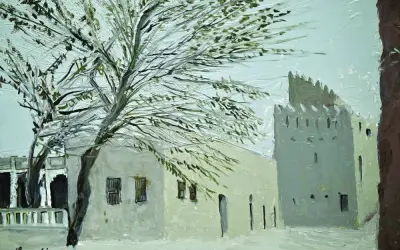Nathania Lela Vipin, a 13 year-old Qatar resident, is making her presence felt in the social and academic circles through her relentless pursuit of learning and excellence in various fields, braving many obstacles.Nathania has been recognised of late by the India Book of Records for ‘'Maximum topics covered in a presentation for five-minutes by a teen.’“I want to become the voice of the voiceless and provide guidance to many like me. I hope my life will be a motivating factor for many of them live a better life” Nathania told Gulf Times in an interaction.Nathania was prematurely born at the sixth month of pregnancy at Hamad Medical Corporation. To add to the troubles, the premature birth resulted in cerebral palsy. The doctors were sceptical if the child would live long as baby Nathania weighed just 650gm at her birth.She had to fight for her life in an incubator at the hospital for over four months. Her parents, Vipin and Neethu underwent a tough ordeal as they also had to take care of Nathania’s brother, Naithan, who is just nine months elder to her.Fighting the obstacles and overcoming them, Nathania was not willing to give up on life and decided to challenge herself to be someone different. As she grew into a teen, she is brimming with confidence and ably supported by her parents, teachers and friends and among others.Today, Nathania has grown into an eloquent speaker and a motivational figure for others to emulate. Her determination is paying off as she started to address small gatherings.“A few years ago, I had a surgery and had to wear an iron cast on my leg. For six months I had to be carried by others and then the thought came up in my mind how people with handicaps need to depend on others for their daily activities,” Nathania recalled.“This made me think that I should tell others that life has to be faced with all the realities and one should never give up. I wanted to tell this to the world and this made me become a motivational speaker,” she stressed.Today, Nathania is a sought after speaker at various platforms in Doha. Her meeting with the renowned illusionist and motivational speaker, Gopinath Muthukad was another turning point in her life that made her all the more determined to continue with greater strides.Then came the India Book of Records for covering the maximum number of topics in a presentation. Nathania covered 14 topics in five minutes. The citation on the India Book of Records says she covered various subjects “including ‘A warrior’, ‘A Social Issue’, ‘Special Education’, ‘Positive Thinking’ and ‘Water’, among others, at the age of 13 years and four days, as confirmed on March 27, 2025.”Nathania, all confidence personified, is looking ahead for greater involvement in every aspect of her life. “I am just a little girl. I feel my life should be a lesson for others to face life with great confidence. Every person has a mission and purpose in this life and they should realise their potential accordingly. If I can be of little help and motivation for others, that gives me immense joy,” added the little champion.

Joseph Varghese
A journalist with a penchant for reporting events, Joseph Varghese digs deep to unearth facts. With several years of experience, including at Gulf Times, Joseph handles health, science and technology, IT and education in addition to everyday developments.
Most Read Stories























